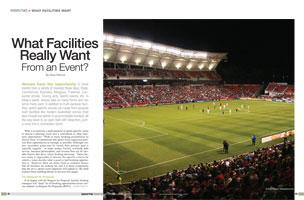
Venues have the opportunity to book events from a variety of markets these days: Trade, Commercial, Business, Religious, Fraternal, Consumer shows, Touring acts, Sports events, etc. In today's world,venues take on many forms and can serve many uses. In addition to multi-purpose facilities, sports specific venues can range from purpose built facilities like modern basketball arenas (that also include ice-plants to accommodate hockey), all the way down to an open field with bleachers, port-a-cans and a concession stand.
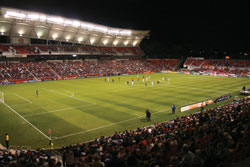 |
| © Brett Pelletier - Dreamstime.com |
What is to motivate a multi-purpose or sports specific venue to choose a sporting event over a convention or other business opportunity? With so many booking possibilities to choose from, it's paramount that sports event organizers position their opportunities as strongly as possible. Although venues' secondary goals may be varied, their primary goal is typically singular - to make money. Facility overhead, debt service, business philosophies, and revenue flow are all variable factors that drive venue booking decisions. These factors make it impossible to discern the specific criteria by which a venue decides what a good or bad booking opportunity is. However, there are many fixed or common factors that all facilities are looking for; and it is those components that the savvy sports event organizer will appeal to. We shall explore these building blocks in the next few pages.
The Request for Proposal
It all begins with the Request for Proposal. Facility booking managers will "shop" for all booking opportunities across various markets via Request for Proposals (RFP's). Don't underestimate the importance of the RFP, as this is the vehicle by which venue booking managers, Convention and Visitor's Bureaus and Sports Commissions will evaluate the potential of an event. From the booking manager's perspective, your event's reputation begins and ends with the RFP. Therefore, a comprehensive, yet succinct RFP is the first thing a facility wants from a National Governing Body (NGB) or Right's holder (hereafter referred to as the organizer).
Initially, the booking manager must establish: will the event fit and do I have available dates? Therefore, the RFP should begin with a basic description of the event with clear date parameters and basic space needs. For example: "Our competition takes place from Tuesday to Sunday (load-in to load-out)and requires 250,000 gross square feet of competition space with 4 meeting rooms to accommodate 500 people classroom style." Use a "just the facts approach."
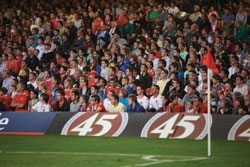 |
| © Wan Rosli Wan Othman - Dreamstime.com |
Upon confirmation of space and dates, the next step will be to evaluate the revenue streams of the event. This is a critical phase of the evaluation process. For a small event, revenue is calculated by a single manager. For a multi-day, multi-sport event with many moving parts, the fiscal evaluation of revenue and expenses will be conducted by committee. Each member of the committee will drill down into a specific component of the revenue and expense side of the equation. The venue booking manager will not only assess the potential revenue for the facility, but will also consider the economic impact for the community. All venues, whether privately or publicly owned, are in existence to make a profit. Additionally, publicly owned venues (including CVB's and sports commissions for that matter) are also charged with helping to drive the economic engine of their community. Therefore, clearly defining attendance figures, revenue sharing opportunities (merchandise, ticket sales, and sponsorship sales), catering needs, competition schedules, hotel pick-up numbers and room flow patterns are extremely important. Moreover, it is at this stage that any financial relationship between a "Local Organizing Committee" (LOC) and the organizer should be spelled out in detail. The venue may not be a part of this relationship, but it is mission-critical information with regard to assessing the fiscal viability of the event.
The event's past history is tantamount to a credit rating. Accurately tracking an event event's history is vital for the organizer to successfully market the event. Don't "cook-up" the numbers you provide. Use consistent parameters for tracking these figures so each year you have an accurate, verifiable accounting. At least 5-years of history should be provided. Since performance clauses are rarely agreed to in the sports world, a diligent booking manager will corroborate the information contained in the RFP; therefore, be sure it's accurate! If inflated numbers are found in the document via due diligence, typically the RFP goes straight in the garbage. Inaccurate documentation in an RFP puts a veil of disbelief over all of the information it contains. Additionally, a good RFP will contain a chart (resembling a calendar) that depicts space needs by day including descriptions of activities (load-in, clinics, competition, load-out, etc.). Since all facilities manage their books via a calendar based software package, this enables the booking manager to easily project space usage, revenue potential, staffing requirements and infrastructure needs by day. Moreover, a stellar chart will also include expected attendance and room blocks by day. Color coding can simplify the information listed. If needed, create a supplemental text companion to the chart if additional specifications are required.
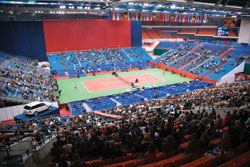 |
| © Pavel Losevsky - Dreamstime.com |
Once a facility has approved an event for booking, the next expectation is to successfully negotiate a lease. The venue will anticipate negotiations to be in good faith. In other words, the venue expects both parties to have the goal of reaching a mutually beneficial agreement. The facility will typically provide a laundry-list of items included in the basic rental of the venue.If the event has specific needs in addition to the basic list, communicate those needs at the onset of the negotiations. Concluding negotiations and then asking for additional items is viewed as duplicitous, not shrewd. The relationship between the venue and the organizer must be a win/win for each party. It does the venue little good to negotiate a lopsided deal that only benefits the facility itself. Although the event may conclude successfully, the organizer will likely never return if they leave dissatisfied. Conversely, it does the organizer absolutely no good to negotiate a similarly lopsided deal. If the venue walks away not seeing the deliverables arrive that were reported in the RFP, then they will not rebook any event from that organization. Additionally, since the sports event world is largely a relationship driven business, the venue or the organizer can garner a bad reputation. That is to say, the relationship between the venue and organizer must be mutually beneficial. A heavily one-sided deal will damage both entities in the long run. Establishing a fair deal is super-important for the long term success of both parties involved. Upon completion of the negotiation and contracting, the venue will transition the event over to its operations staff and assign a coordinator.
Coordinating With the Operations Staff
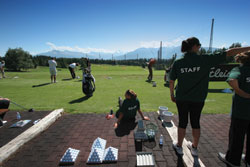 |
| © Photogolfer - Dreamstime.com |
The venue's operations staff is where"the rubber meets the road." They will look to the organizer's event operation staff to advance the show in a comprehensive and timely manner. This is a critical phase of the planning and is directly linked to the event's success. A poorly advanced event places the venue in the position of having to blindly anticipate needs instead of actual planning based on comprehensive information. The facility expects a production rider or a detailed work order be provided outlining all equipment, services and timing needs well in advance of the load-in. A well-organized event operations staff will position the venue to exceed the expectations of the organizer and the attending patrons. The goal is to provide both the facility and the organizer a platform from which they can both succeed.
After many weeks of planning on everyone's part, the event's opening day will seem to come quickly. Everyone wants a pleasant and safe environment for the attendees and fans. With that in mind, the content of the event should include everything outlined in the RFP. The local community expects their venues to adequately vet event producers whereby bringing quality, affordable entertainment to town. In today's age of social media, bad news travels at a lightning pace. When a patron is dissatisfied with an event, they blame the venue as well as the event's producer. In essence, both walk away with a black eye. The facility expects the production of the event to closely match what was reported in the RFP. Additionally, the revenue streams associated with the event should be approximately equal to or exceed the purported history in the RFP. Therefore, getting the event booked and realizing the revenue planned for are the largest components of what facilities want from an event.
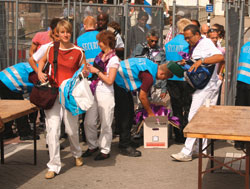 |
| © Jan Kranedonk - Dreamstime.com |
As the event unfolds, operational issues always occur and are the nature of the beast. That's why the operations motto is "the sales manager sells the dream while the operations department manages the nightmare."In short, challenges are to be expected. Last minute needs will always surface. The facility will look to the organizer's event operations manager to coordinate with the venue's own operations staff to take a proactive approach in mitigating the challenges as they occur. A reactionary response from the team of operations professionals will truncate everyone's ability to solve the issue. I believe Ben Franklin's statement during the signing of the Declaration of Independence says it best: "We must, indeed, all hang together, or most assuredly we shall all hang separately."
A Strong Finish
Upon conclusion of the event, when all of the attendees and participants have gone home, the last phase of the booking comes into play - the load-out and final billing. A facility will look to the organizer to return the venue to near the condition it was on the front side of the event. Normal debris and wear and tear is expected. Any peculiar load-out needs should be included in the production advance for the event. The event operations staff should remain on hand until the load-out is complete. After the load-out concludes, the facility will prepare a billing document. If the event's needs were adequately addressed during the negotiation process, the billing should be quite simple and sans conflicts or surprises. The production advance plays a critical part in pain-free billing. Fewer surprises during the event equates to fewer billing issues.
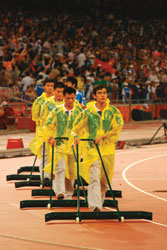 |
| © Carmentianya - Dreamstime.com |
The sports market has continued to remain strong in a troubled economy. This fact gives the sports event organizer a leg up on other market segments. The challenge is to get the sports world to provide event opportunities in a similar format to the other markets. We may never be able to compare apples to apples, but we can compare a Macintosh apple to a Red Delicious apple and make informed decisions. Essentially, facilities want to be able to obtain accurate, concise RFP's enabling them to identify good versus bad booking opportunities across all market segments. Venues want business relationships that are based on mutual benefit and respect, enabling each party to have a high level of success. Honest communication is the cornerstone of this. As an event organizer if you are: clearly defining the event in the RFP using accurate numbers; being needs-specific during the negotiation process; being reasonable during challenges; ensuring an accurate production advance for the event is provided; and most importantly, delivering the revenue opportunities you represented, you'll be a an equitable partner in any venue's eyes.

